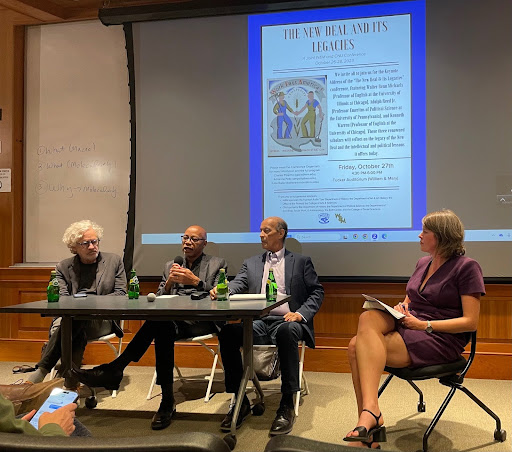Friday, Oct. 27, the New Deal and its Legacies, three-day joint academic conference between the College of William and Mary and Christopher Newport University, held its keynote address in the Tucker Hall theater. The 90-minute panel featured University of Pennsylvania professor emeritus of political science Adolph Reed Jr., University of Illinois-Chicago professor emeritus of English Walter Benn Michaels and University of Chicago Fairfax M. Cone Distinguished Service Professor of English and Literature Ken Warren. Christopher Newport University assistant political science professor Katie Radar moderated the panel.
Radar, associate history professor of history and Director of Undergraduate Studies Adrienne Petty, and art history professor Charles Palermo organized the conference.
“Dr. Palermo brought the three of us together, and we realized that we had common interests in this historical period, and so the conferences grew out of our shared interest in the New Deal and desire to bring scholars here who think about these issues,” Petty said. “Also, it’s the 90th anniversary of the New Deal. So we thought it was a perfect opportunity to engage in these conversations about the legacy of the New Deal, especially given our current political moment.”
The New Deal refers to a series of public works projects and financial reforms implemented by the federal government in the 1930s under President Franklin D. Roosevelt in response to the Great Depression. Its long-term impact remains a source of conflict among scholars.
Radar began by asking all three panelists about the most significant legacies of the New Deal and how the period has shaped both their political and intellectual work.
“One is the origins of the modern Civil Rights movement and the origins of the modern Women’s movement are legacies of the New Deal,” Reed Jr. said. “The idea that the government has public power. The authority of the federal government has a role to play in stabilizing the society. Making peoples’ lives better. ”
“One is the origins of the modern Civil Rights movement and the origins of the modern Women’s movement are legacies of the New Deal,” Reed Jr. said. “The idea that the government has public power. The authority of the federal government has a role to play in stabilizing the society. Making peoples’ lives better. ”
Warren underscored the forgotten significance of this era for its social reform.
“Part of what has driven this conference as well is the extent to which many of these who we, who one might think of as supporting of what we have been able to taken for granted, have now been able to turn around and make the New Deal, in some sense, the source of all contemporary ills rather than that which has given many of us the sound basis for kind of the lives we have been able to construct,” Warren said.
Panelists emphasized that the New Deal brought novel implications on representation for underrepresented groups in Virginia.
“It was becoming possible for rank and file Black Americans to think that they could hold accountable the state in a variety of forms to their own interests that did not necessarily in the first instance have to go through elite blacks as spokespersons for them,” Warren said.
In the latter half of the talk, the panelists shifted towards assessing right and left wing viewpoints of the New Deal. They particularly honed in on its role in shaping the right-wing neoliberalism movement.
“It makes sense for us to look at the Kennedy administration as where the zygote of what later would be known as neoliberalism took shape,” Reed said.
The scholars agreed that since the 1930s, the equality promised within the New Deal has not been fully instituted. Michaels put some of the blame for this failure on left wing movements.
“The new left manifesto sort-of talks about as if the problem of scarcity, problems of poverty have been fundamentally solved,” Michaels said. “So that turned out to be bullshit. That’s not true. Those problems have not been solved. Let’s go beyond equality which goes behind the idea that ‘Yeah, if you earned it, you’re cool’ and if you didn’t succeed, it’s your fault it’s on you.”
For more on Michaels and Reed’s work, their co-authored book, “No Politics But Class Politics”, was released in February and dedicated to Warren.

